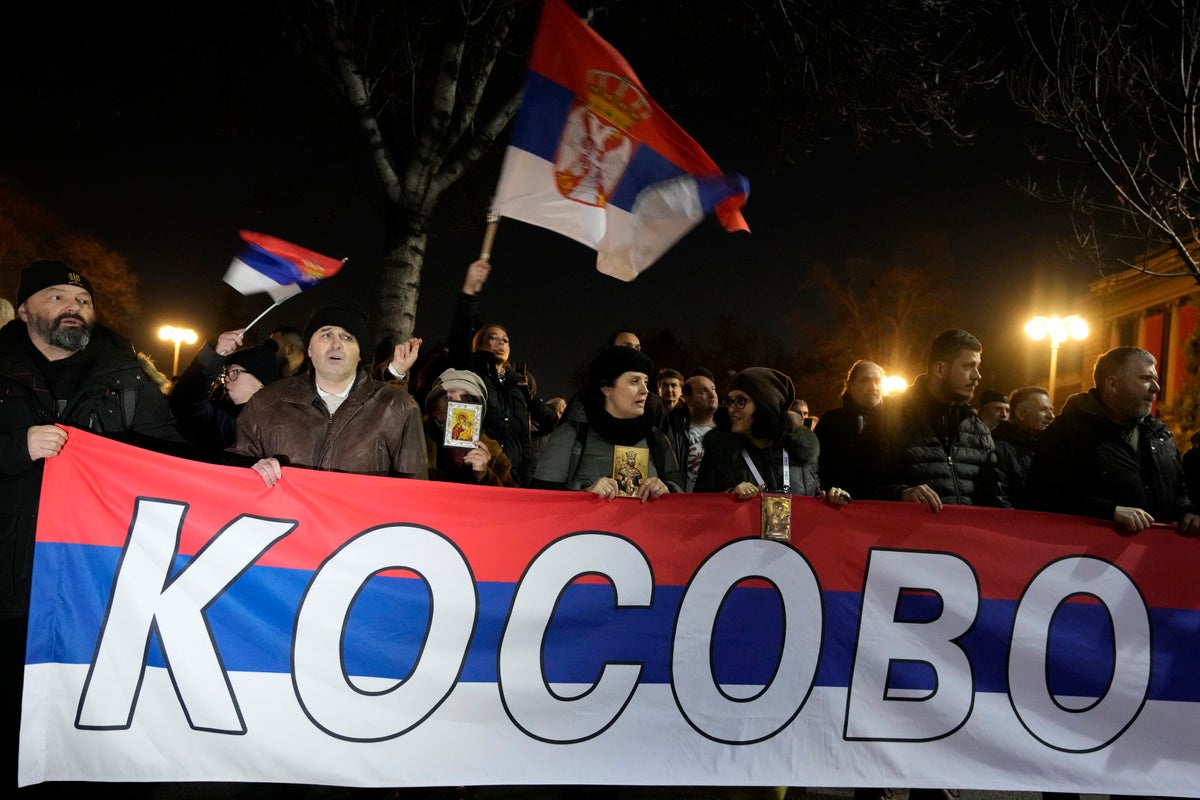
Kosovo is celebrating 15 years of independence with a month of celebrations starting Friday while still facing serious challenges with Serbia, which refuses to recognize the autonomy of its former province.
A military parade, ceremonies at monuments to national heroes and a special session of parliament are some of the anniversary events planned in the capital, Pristina.
Europe's youngest country unilaterally declared independence from Serbia on Feb. 17, 2008, nearly nine years after a 78-day NATO bombing campaign in 1999 ended Belgrade's bloody crackdown on ethnic Albanian separatists. The International Court of Justice ruled in 2010 that the declaration did not violate international law.
The United States and most Western powers are among the 117 countries that have recognized Kosovo's statehood, and about 200 international organizations have allowed Kosovo to join, although not the United Nations. A number of European nations, including Bosnia, Cyprus, Greece, Moldova, Romania, Spain, Slovakia and Ukraine, do not acknowledge the Republic of Kosovo.
Serbia, which for centuries considered Kosovo the cradle of its civilization, still sees it as part of its own territory. Russia and China have continuously backed Serbia's position, as have Algeria, Morocco, Belarus, South Africa, Iran and other nations that do not want to get drawn into the dispute.
While the European Union has mediated negotiations between Serbia and Kosovo since 2011, few of the 33 signed agreements were implemented. Both the EU and the United States have pressed for a faster reconciliation since Russia invaded Ukraine almost a year ago, fearing another conflict in the Balkans.
U.S. and EU envoys visited Pristina and Belgrade regularly in recent months to encourage them to accept a new proposal for normalizing relations. The proposal’s details have not yet been made public.
U.S. Ambassador to Kosovo Jeffrey M. Hovenier told The Associated Press the proposal was “an interim step, that ... would regularize relations in very meaningful ways and be of enormous benefit both to Kosovo and Serbia.”
Washington also has increased pressure on Kosovo's government to implement a 2013 agreement to establish an Association of Serb-Majority Municipalities in ethnic-Serb dominated northern Kosovo. In 2015, Kosovo’s Constitutional Court declared part of the agreement unconstitutional on the grounds it excluded other ethnic groups and could entail the use of executive powers.
According to the 2013 plan, the association would coordinate work on education, health care, land planning and economic development at the local level. Kosovo's government fears the group would eventually undermine the country’s statehood with the help of Belgrade and turn northern Kosovo into another Republika Srpska, a largely self-governing Serbia-dominated entity in Bosnia.
Pristina accuses Belgrade of exploiting the ethnic Serb minority, which it says represents just 7% of the 1.8 million population, to raise bilateral tensions. Ethnic Serbs have 10 seats in the 120-seat parliament and a government Cabinet post. More than 90% of Kosovo's population is ethnic Albanian.
Kosovo's prime minister, Albin Kurti, said he was hopeful the new EU-led plan would bring Serbia and Kosovo to the final stage of mutual recognition.
"If we normalize relations with Serbia this year, that will be a great thing, not only for Kosovo, but I would say particularly for Serbia,” Kurti said.
Tensions between Pristina and Belgrade remain tense. Late last year, Serbia asked the NATO-led peacekeeping force in Kosovo to send 1,000 of its troops to protect ethnic Serbs in northern Kosovo. Members of the community had raised 16 barricades blocking roads in the north following the arrest of a police officer. The request was not approved.
Lars-Gunnar Wigemark, head of the EU’s rule of law mission in Kosovo, called December incident a “very tense standoff with barricades” and “the most serious crisis facing Kosovo … for the past decade.”
The EU has told both Kosovo and Serbia that establishing productive ties is a precondition to their joining the bloc. Kosovo applied to become a candidate for EU membership, while Serbia has sought for years to make progress in its membership talks with Brussels.
In Serbia, pro-Russia right-wing groups have demanded that Belgrade stop all normalization negotiations with Kosovo. Serbian President Aleksandar Vucic has said that would isolate his country internationally and mean the end of Serbia’s integration into the EU. Vucic has said he was ready to consider the latest Western plan.
Along with ongoing economic problems and needing to meet EU conditions for governance reforms, Kosovo, which is one of Europe's poorest countries, is still grappling with the legacy of the late 1990s war with Serbia.
Former President Hashim Thaci and four other wartime heroes from the Kosovo Liberation Army were arrested in November 2020 and transferred to the detention center of a tribunal in The Hague, Netherlands, to face charges of murder, torture and persecution. All have denied the charges.
The special court is investigating alleged war crimes and crimes against humanity linked to the actions of the KLA during and after the war in Kosovo.
___
Semini reported from Tirana, Albania.







